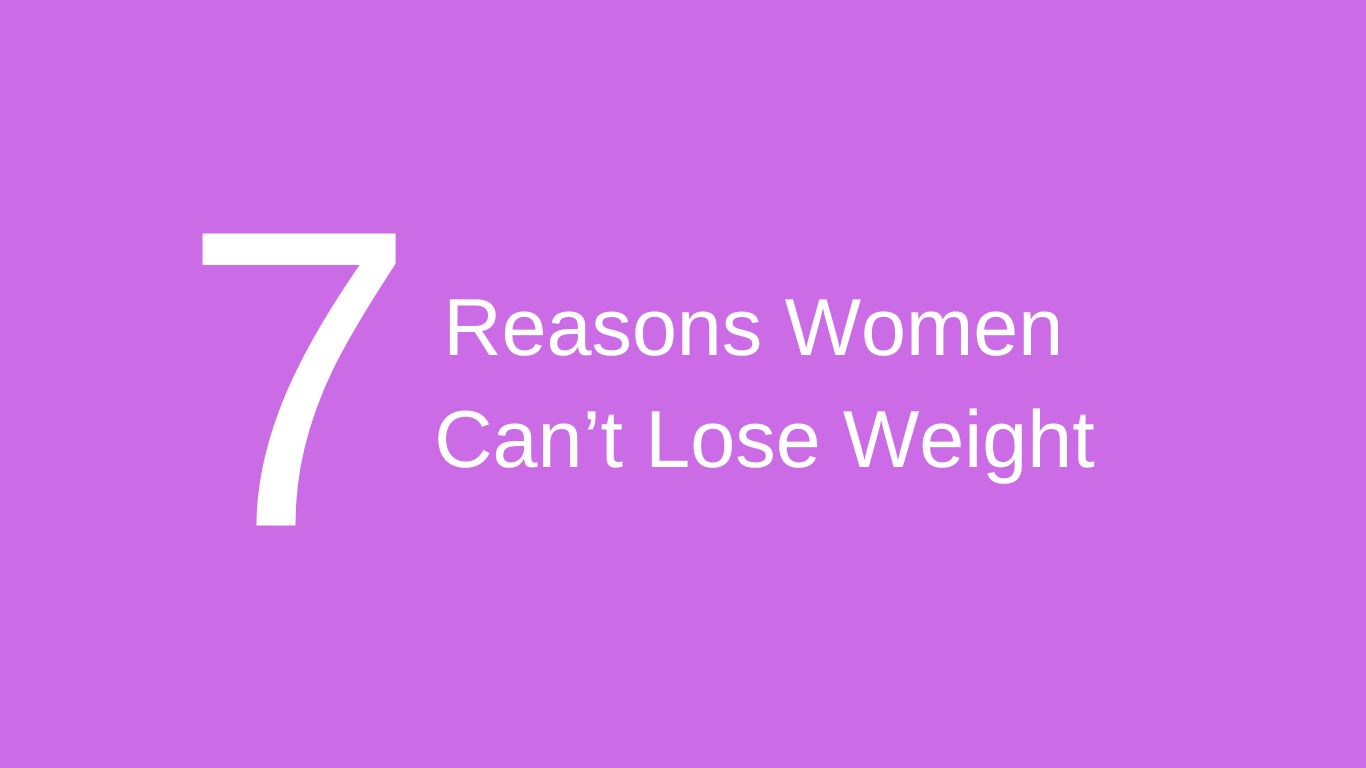Any women over 40 will know that losing weight is not just about eating less and exercising more. Weight loss is influenced by a wide range of factors, from genetics and hormonal changes to environmental and psychological challenges.
Research has shown that only ≈20% of overweight individuals are successful at long-term weight loss. Studies point out that weight loss eventually slows down, stagnates or reverses in 85% of the cases.
The exact reasons for obesity remain unknown, but there is a complex link between biological, psychosocial and behavioural factors. This blog will delve into 7 reasons why women may struggle with weight loss, backed by research and evidence.

1. Previous Weight Loss Attempts
Repeated attempts at weight loss can make it harder to lose weight in the future. Yo-yo dieting, characterized by cycles of weight loss followed by weight regain, disrupts metabolic processes.
Each time the body loses weight, it slows its metabolism to conserve energy, a survival mechanism from our evolutionary past.
So when women repeatedly lose and regain weight, their metabolic rate may not return to its original level, making it harder to shed pounds in subsequent attempts.
Studies show that frequent dieting can also increase cravings for high-calorie foods, further hindering weight loss success.
2. Anthropometry (the study of the body’s measurements/proportions)
A woman’s body composition—her ratio of muscle to fat, body shape, and fat distribution—can make weight loss more difficult. In anthropology, factors like height, weight, body composition, size and BMI are considered.
Body size, influenced by fat-free mass, plays a vital role in weight loss outcomes.
Women tend to store more fat in the hips, thighs, and buttocks due to reproductive needs, and this fat is often more resistant to being burned for energy than fat in other areas.
Taller or heavier individuals with more fat-free mass typically have a higher basal metabolic rate, potentially facilitating quicker weight loss with similar calorie intake.
Conversely, shorter and lighter individuals may find weight loss more challenging.
Several studies have also identified that those with a BMI > 30 kg/m2 struggle with recommended physical activity, whereas those with a BMI of 25 kg/m2 perform better.
Concluding for these trials, that high adiposity (bodyfat) is linked to low physical activity that in turn affects weight loss outcomes.
Initial success, quick wins at the start, are also crucial for eventual success in weight loss efforts.
It appears that those that have fewer follow-ups, have a lower initial BMI and have minimal initial weight loss are more likely to fail to maintain any weight loss after 12 months.

3. Stress
Chronic stress increases levels of the hormone cortisol, which promotes fat storage, particularly belly fat.
Women under stress often turn to comfort foods high in sugar and fat. This combination of increased fat storage and overeating makes weight loss, particularly belly fat loss, challenging for women.
Additionally, poor sleep quality is linked to higher levels of stress, leading to an increase in cortisol, a hormone that promotes fat storage, and again especially around the abdominal area.
4. Medications
Certain medications may affect weight loss efforts by influencing metabolism, appetite, or how the body stores fat.
Common medications like antidepressants, antipsychotics, steroids, and even birth control pills may lead to weight gain in some women.
These drugs may alter hormonal balance or increase water retention, making it harder for women to shed pounds.
For those on long-term medication, discussing alternative treatments, or lifestyle adjustments with a healthcare provider can help minimize weight gain.
Contraception use
Recent evidence suggests no clinically and statistically significant short or long-term effects of oral contraceptives on weight in women with normal or higher BMI.
That said, a recent secondary analysis suggested an association between oral contraceptive use and weight gain after weight loss, although, only a small number of individuals were studied for any conclusive evidence.
The available evidence is also insufficient to estimate the effect of oral contraception on weight loss outcomes during energy (calorie) restriction.
But it does make us aware that there could potentially be a link, and that this area warrants further clinical trials for a better understanding of how contraception may or may not affect weight loss success.
Polycystic ovarian syndrome (PCOS)
Weight gain and obesity can contribute to PCOS/PCOD development in genetically predisposed women.
In particular it appears to be the psychological factors, including depression and low self-control, that may hinder weight loss efforts in certain PCOS patients and not the physical condition itself.
A systematic review of 14 lifestyle intervention studies found no statistically significant difference in weight loss between women with and without PCOS.
At this time, it appears to be the psychological effects of PCOS are more impactful than physiological PCOS changes – further studies are required.

5. Menopause
Menopause is a significant hurdle for many women when it comes to weight loss.
During menopause, the body undergoes hormonal changes, particularly a drop in estrogen levels, which leads to a slower metabolism and changes in fat distribution.
This hormonal shift can cause women to gain weight, especially around the abdomen, resulting in belly fat that can become difficult to shift.
Moreover, menopause can bring on other symptoms like sleep disturbances, mood swings, and fatigue, making it harder to maintain the energy and motivation needed to pursue weight loss goals.
It’s important for women to discuss options such as HRT with their GP and alternative remedies such as menopause weight loss supplements.
6. Insulin Resistance
Insulin resistance is another major factor that can make weight loss difficult for women.
This condition occurs when the body’s cells become less responsive to insulin, a hormone that regulates blood sugar.
As a result, more insulin is needed to process glucose, leading to elevated levels of this hormone.
High insulin levels are associated with fat storage, particularly around the abdomen, making weight loss challenging.
Insulin resistance is commonly linked to conditions like polycystic ovary syndrome (PCOS) and type 2 diabetes, which further complicate weight management .
7. Genetics
Genetics can play a significant role in a woman’s ability to lose weight.
Studies suggest that genetics can be estimated at 40% to 70% of an individual’s body mass index (BMI), affecting how fat is stored and how easily the body burns calories.
It’s a complex area still being studied with genetic factors contributing to varied weight loss responses between people.
Variations in genes related to appetite control, metabolism, and fat storage can predispose some women to struggle with weight loss.
And as we’ve seen above, other variables like age (menopause and build up of insulin resistance), sex, race, deficit accumulation (previous weight loss attempts) and baseline weight (your body composition make up) do make weight loss more challenging for specific women.

Conclusion
Losing weight is a multifaceted challenge for women, influenced by factors that range from how you’re your body is made up and your genetics to hormonal fluctuations due to menopause and PCOS, stress and insulin resistance and past dieting attempts.
While these obstacles can make weight loss difficult, understanding these factors can help women adopt more effective strategies for long-term weight loss success.
Lifestyle adjustments, hormonal balance, and individualized approaches are key to overcoming these challenges.

